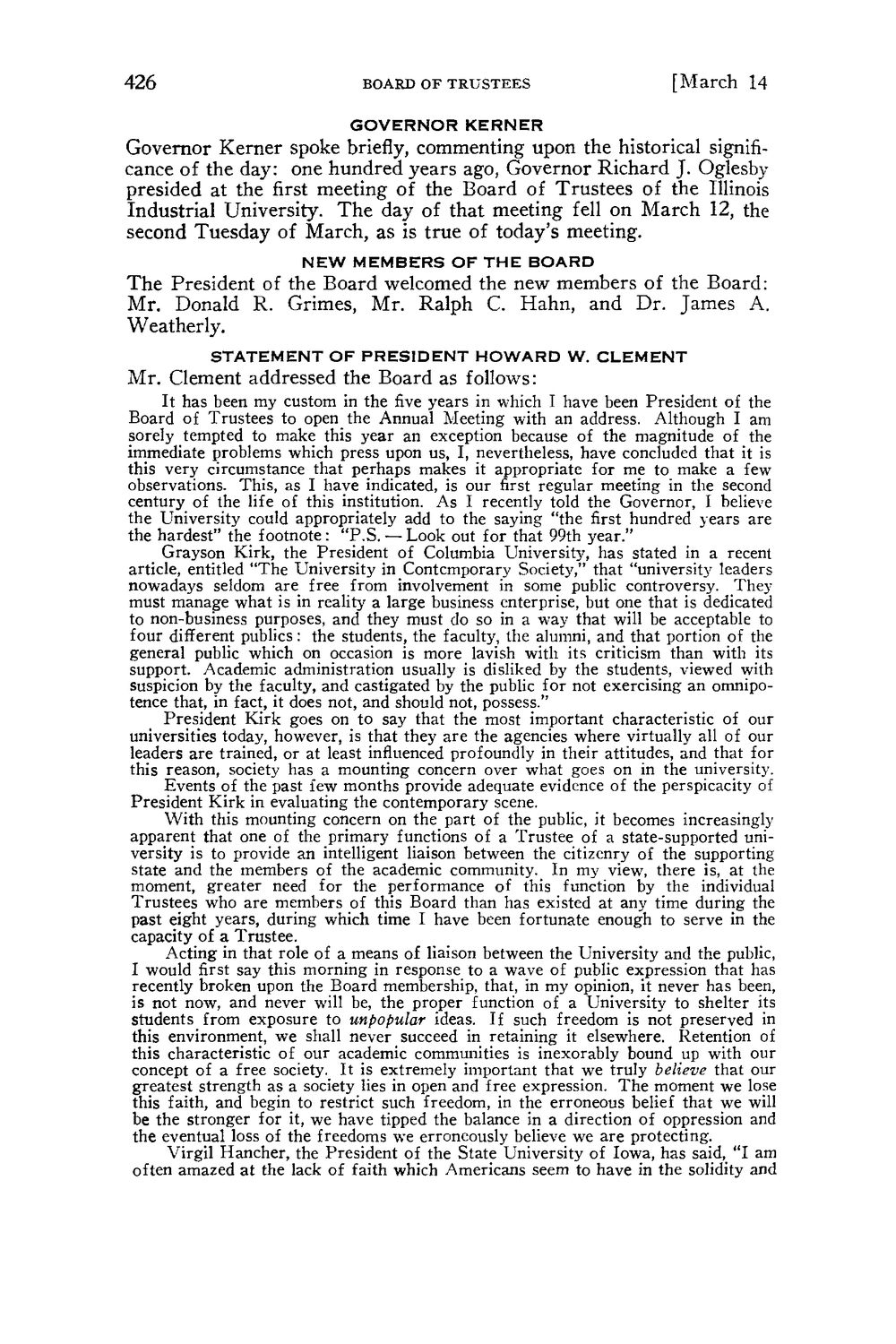| |
| |
Caption: Board of Trustees Minutes - 1968
This is a reduced-resolution page image for fast online browsing.

EXTRACTED TEXT FROM PAGE:
426 BOARD OF TRUSTEES [March 14 GOVERNOR KERNER Governor Kerner spoke briefly, commenting upon the historical significance of the day: one hundred years ago, Governor Richard J. Oglesby presided at the first meeting of the Board of Trustees of the Illinois Industrial University. The day of that meeting fell on March 12, the second Tuesday of March, as is true of today's meeting. NEW MEMBERS OF THE BOARD The President of the Board welcomed the new members of the Board: Mr. Donald R. Grimes, Mr. Ralph C. Hahn, and Dr. James A. Weatherly. STATEMENT OF PRESIDENT HOWARD W. CLEMENT Mr. Clement addressed the Board as follows: It has been my custom in the five years in which I have been President of the Board of Trustees to open the Annual Meeting with an address. Although I am sorely tempted to make this year an exception because of the magnitude of the immediate problems which press upon us, I, nevertheless, have concluded that it is this very circumstance that perhaps makes it appropriate for me to make a few observations. This, as I have indicated, is our first regular meeting in the second century of the life of this institution. As I recently told the Governor, I believe the University could appropriately add to the saying "the first hundred years are the hardest" the footnote: "P.S. — Look out for that 99th year." Grayson Kirk, the President of Columbia University, has stated in a recent article, entitled "The University in Contemporary Society," that "university leaders nowadays seldom are free from involvement in some public controversy. They must manage what is in reality a large business enterprise, but one that is dedicated to non-business purposes, and they must do so in a way that will be acceptable to four different publics: the students, the faculty, the alumni, and that portion of the general public which on occasion is more lavish with its criticism than with its support. Academic administration usually is disliked by the students, viewed with suspicion by the faculty, and castigated by the public for not exercising an omnipotence that, in fact, it does not, and should not, possess." President Kirk goes on to say that the most important characteristic of our universities today, however, is that they are the agencies where virtually all of our leaders are trained, or at least influenced profoundly in their attitudes, and that for this reason, society has a mounting concern over what goes on in the university. Events of the past few months provide adequate evidence of the perspicacity of President Kirk in evaluating the contemporary scene. With this mounting concern on the part of the public, it becomes increasingly apparent that one of the primary functions of a Trustee of a state-supported university is to provide an intelligent liaison between the citizenry of the supporting state and the members of the academic community. In my view, there is, at the moment, greater need for the performance of this function by the individual Trustees who are members of this Board than has existed at any time during the past eight years, during which time I have been fortunate enough to serve in the capacity of a Trustee. Acting in that role of a means of liaison between the University and the public, I would first say this morning in response to a wave of public expression that has recently broken upon the Board membership, that, in my opinion, it never has been, is not now, and never will be, the proper function of a University to shelter its students from exposure to unpopular ideas. If such freedom is not preserved in this environment, we shall never succeed in retaining it elsewhere. Retention of this characteristic of our academic communities is inexorably bound up with our concept of a free society. It is extremely important that we truly believe that our greatest strength as a society lies in open and free expression. The moment we lose this faith, and begin to restrict such freedom, in the erroneous belief that we will be the stronger for it, we have tipped the balance in a direction of oppression and the eventual loss of the freedoms we erroneously believe we are protecting. Virgil Hancher, the President of the State University of Iowa, has said, "I am often amazed at the lack of faith which Americans seem to have in the solidity and
| |